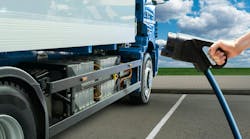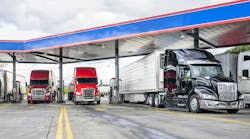ORLANDO. Trucking needs to move beyond merely learning about biodiesel fuel, contends Steph Sabo, maintenance manager for Norrenberns Truck Service (NOTS). Sabo said that he still doesn’t understand why discussions about biodiesel within the trucking industry continue to be of an educational nature.
Norrenberns has used a B11 blend of the fuel, comprised of 89% petroleum-based diesel fuel and 11% soybean-based biodiesel, for nearly four years. While they’ve experienced some problems from time to time, along with a 0.2 mile per gallon loss in fuel economy, the move has still paid off for Sabo’s fleet.
“Why are we still having this discussion about biodiesel?” Sabo said during a presentation here at the Technology & Maintenance Council. “It seems a lot of people are still misinformed. Yes it costs more and yes we’ve had some fuel mileage degradation. But in Illinois [where Norrenberns is based] we get a tax savings for using biodiesel, an elimination of the state’s 6.25% sales tax on fuel. At the end of the day, that adds up to a big savings for me.”
ORLANDO. Trucking needs to move beyond merely learning about biodiesel fuel, contends Steph Sabo, maintenance manager for Norrenberns Truck Service (NOTS). Sabo said that he still doesn’t understand why discussions about biodiesel within the trucking industry continue to be of an educational nature.
Norrenberns has used a B11 blend of the fuel, comprised of 89% petroleum-based diesel fuel and 11% soybean-based biodiesel, for nearly four years. While they’ve experienced some problems from time to time, along with a 0.2 mile per gallon loss in fuel economy, the move has still paid off for Sabo’s fleet.
“Why are we still having this discussion about biodiesel?” Sabo said during a presentation here at the Technology & Maintenance Council. “It seems a lot of people are still misinformed. Yes it costs more and yes we’ve had some fuel mileage degradation. But in Illinois [where Norrenberns is based] we get a tax savings for using biodiesel, an elimination of the state’s 6.25% sales tax on fuel. At the end of the day, that adds up to a big savings for me.”
Yet Sabo cautioned that fleets can’t just fuel up with any blend of biodiesel and head on down the road. He sticks with soybean-based biodiesel blends from accredited producers to make sure he’s getting good quality fuel. He also pays very close attention to the micron-rating on truck fuel filters, making sure they are four-micron or better, to capture some of the sediments and other byproducts that can form in the tank from using biodiesel.
“Since it’s an organic-based material, biodiesel can contain six times as much water as petroleum-based diesel fuel,” said Keith Bechtum of the Donaldson Company, which makes fuel filters. “Water can lead to the corrosion of fuel lines and can help encourage microbial growth in the fuel, which is hard to eliminate from fuel tanks once it takes hold. About 20% of the problems fleets experience with biodiesel can be traced to microbial growth.”
Sabo noted that many of these issues can be prevented by regular checks of fuel tanks and fuel lines, use of low-micron filters, and use of a top-grade biodiesel producer. “We’re still seeing million-mile motors in our trucks even after switching to biodiesel,” he said.
Another big reason fleets need to keep biodiesel on their collective radar is that it is one of the simplest alternative fuels for the trucking industry to use, and the federal government is requiring more production and use of it, according to Professor Tim McDonald, of Auburn University’s center for biofuel and bioenergy.
“The Energy Independence and Security Act of 2007 calls for 500 million gallons of B100 [a fuel made up of 100% biodiesel] to be produced by this year, rising to one billion gallons by 2012,” McDonald explained. “Also, no alternative fuel is as easy to use as biodiesel for trucks. It’s a liquid, so the distribution infrastructure is already in place, and trucks can start using it right away with few modifications. “
There are also issues with using high concentrations of biodiesel in truck engines, again due to the organic nature of the fuel. Lilo Hurtado, an applications engineer with ExxonMobil, said biodiesel can create more acids that can lead to more metallic corrosion, especially lead and copper. It can also lead to more piston deposits and some degradation of the engine oil. Yet Hurtado noted most of those issues can be contained through maintenance checks with oil analysis programs.
Hurtado added that 90% of the fuel filter plugging problems fleets experience are directly related to the fuel blend itself, while only 10% relate to biodiesel’s cold-weather performance. One way to avoid the problem is to make sure there’s an extra filtration process added between the moment biodiesel is pumped from a storage tank into a vehicle, noted Donaldson’s Bechtum. “That eliminates a lot of those issues,” he said.




